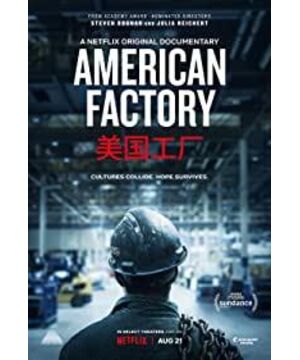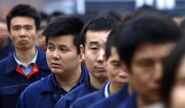Recommended by alumni, I watched the documentary of American Factory today, and I was still deeply shocked. Here are some thoughts:
1. Thirty years Hedong, thirty years Hexi. The United States has always exported capital to China and the world. Maybe the old and the United States did not expect to rely on China to export capital to help local economic development.
2. Capital never sleeps and is efficient. A factory only makes money if it's running 24/7. Those workers who are inefficient and can't endure hardship, especially the United States who are not good enough and like to do things in the film, will definitely be eliminated first.
3. The documentary mentions 375 million people, a terrible number, which is the impact of the fourth industrial/technological revolution in the world right now. With the development of artificial intelligence and automation, so many people will be unemployed in the future. Not only the workers in these factories, but also the white-collar workers who are free to watch documentaries and write film reviews. So think about whether the work you are doing now can be replaced by programs and machines in ten or twenty years, and whether the technical content and barriers are sufficient, and then quickly lay out for the future. In China, you are even less likely to have labor unions to solve problems for you like some old Americans, not to mention that American labor unions don’t seem to be able to win against anti-union organizations.
4. There is an eternal conflict between the interests of workers and the interests of capitalists, and how to find a balance between them is also an eternal topic. In the United States, this kind of conflict is very obvious, because the culture of freedom and openness in the United States has been displayed for a long time. But in today's globalized world, it seems that the good treatment that Americans enjoy has also been "corrected". No, with the closure of major factories such as General Motors in the United States, it also shows that the interests of Zeng Jin American workers have exceeded the cost of capitalists, and this is also the reason why these workers can no longer receive Zeng Jin's wages and treatment. Chinese workers are hard-working and hard-working, which has given China its current status in the world. But are Chinese workers losing too much? Lost freedom and human rights for work? I don't know, but at least I can't bear the work intensity of 12 hours a day and only one or two days off every month like Fuyao China workers (it seems that this is also the minimum requirement for anti-labor laws?)
5. Continuing on the point above, I also disagree with many of the views that "capitalists exploit workers". This view is clearly derived from Marx's "exploitation theory". But Marx actually ignored the labor of capitalists (Cao Dewang in the film, who is in his 70s, has to travel between China and the United States every month, and he has to worry about the installation of fire extinguishers. The labor he paid, especially the mental labor, was There are many) and the risk of capitalists (this point does not need to be explained, ordinary employees may lose a month’s salary if they lose their jobs. Cao Dewang’s loss may be tens of millions of dollars, and his responsibility is even greater).
6. In fact, Cao Dewang in the film also has inner contradictions. What he is doing now has promoted economic and social development, but has lost a lot of the pure beauty of the past. This may be his original intention to believe in Buddhism to find spiritual liberation.
Finally, I quote a film review written by my alumni:
American Factory is very well made, kudos to the Obamas. The story in itself is a dipped in irony. It follows the journey of a Chinese capitalist bringing work to the America proletariat. What is refreshing about this documentary is that it doesn't seem biased, just telling the situation as it is. American media has been taking massive dumps on people's chests for so long, it can be quite disorienting at first to get a whiff of fresh air that is not laced with the putrid aroma of raw sewage.
View more about American Factory reviews








